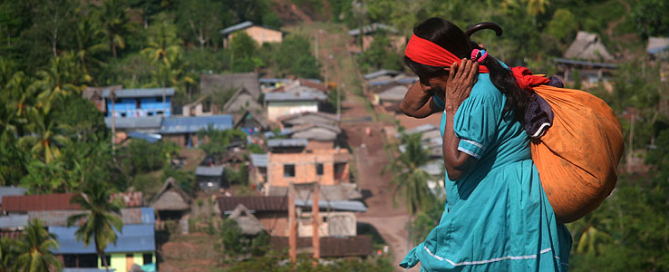 Peru – Km 142,190
Peru – Km 142,190
From Ecuador, I entered to Peru, through the border post of Namballe, located in Cajamarca, in the northern Peru. And there, for a couple of weeks, I kept pedaling through the provinces of Amazonas, San Martin and Loreto, a difficult area not only for the molas that rise steeply up to 2300 mt, passing within hours of a cold mountain jungle climate, but to really sunny areas. Towards Aguas Verdes, the police stopped me twice and both times asked me if I had stolen.

On more than one occasion I found it difficult to communicate with people, Peru is a country that is home to various ethnic groups, and so there are more than 50 languages, although most people are multilingual. But in this isolated area of the country, the great achievement is to find a place to sit and eat. Over the years I’ve been on the road, at lunchtime, I just want to eat well. Perhaps this is the only thing I demand in my day to day basis. Pedaling through such mountains not only opens your appetite, but it consumes your muscles. Watching myself in front of a mirror increasingly skinny worries me. During my short tour in this country there were more times that I got up from a table, disconsolate than satisfied.
In 2001, before leaving to Africa, I visited the South African Embassy in Buenos Aires, and its manager in tourism, knowing that I was going to cross that continent by bicycle, a little indignantly asked, “Why do you start your trip to Africa? You have no idea of precariousness that exists there? You know some African country? What countries of the world have you visited?” Shocked at the reaction of the official, who only seemed to want to change the destination of my trip, I mentioned, almost quietly, some of South American countries, including Bolivia and Peru. “Ah, well,” said the guy on his coat and tie, “if you traveled by these two countries you can then go to Africa, because poverty and the conditions in which their people lives wont surprised you“.
When I arrived in Peru I remembered that meeting. The official was right, disorder, insecurity and lack of hygiene that exists in the Peruvian east is no different from Africa. Wanting to navigate the Amazon River to the Atlantic, I came to Yurimagua, the city where boats leave to Iquitos and where I would continue my journey to the triple border (Peru, Colombia and Brazil).
Both Peruvian cities are striking. They are extremely noisy due to hectic traffic, the streets are destroyed and the accumulation of garbage exists everywhere, including on the banks of rivers and its tourist piers. There are thousands of bottles or plastic bags and other debris, while not far there are men who bathe in underwear, children swimming and women washing clothes so normal. My traveling companion, Manuel, an older man who often travels to Manaus in search of merchandise he told me about it: “Due to the lack of environmental culture in most citizens, Iquitos became through years a major health problem not only for the waste they are dumped directly into the river for its population, but because the two channels bordering the city receive untreated water informal settlements and expanding markets throughout the city. And in the rainy season, dengue, malaria and leptospirosis become the worst threat to the population”.

The day I arrived to Yurimagua I stayed in a pension, different from the economic pensions of most Latin American countries where usually backpackers or bicycle travelers sleep. That night I woke up to the sound of a rat that was inside a saddlebag of my bike eating my food.
For 4 days I traveled in two boats down the Amazon River to the triple border and in them there is not a trash can, its employees sweeping three times a day, throwing everything overboard. Instead in Brazilian ships sailing the same river they pass with a broom and shovel, picking all residue found.
Also its neighboring country, Ecuador, is different. There routes are riddled with signs that raise awareness the public about the care of the environment and the importance of not throwing garbage into rivers or on the road, but in Peru this does not happen. They say that in the part of the range is different, and the landscapes are breathtaking; but here friends in the jungle, the trash is impressive . A pity.
But in those days the problems in the department of Loreto was another: centered in the city of Iquitos, the social manifestations demanded that the lot 192 (the main oil block in the country) be operated by Petroperu. According to Manuel the claim of the population is against centralism and in defense of the regional economy because after 4 decades the presence of multinational operators did not bring progress and development to the people.[:]


